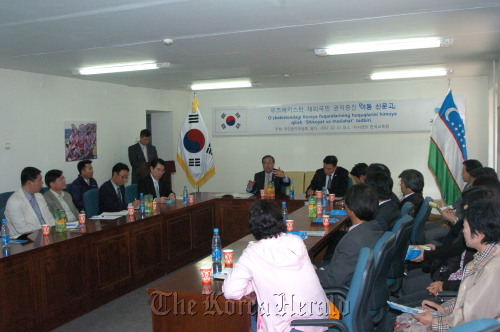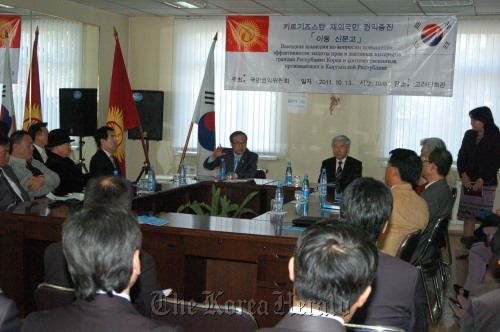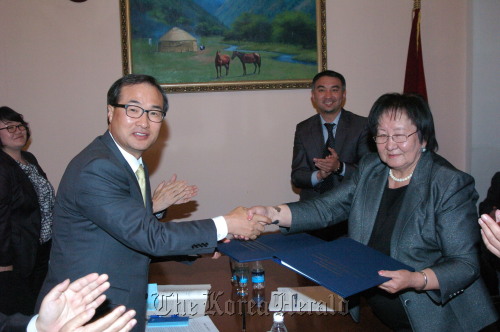Kim Dai-sik visits Uzbekistan, Kyrgyzstan, Kazakhstan to launch ombudsman outreach program in Central Asia
The Anti-Corruption and Civil Rights Commission, a leading governmental panel promoting citizens’ rights, plans to reach out to Korean firms and ethnic Koreans in Central Asia through a wide-ranging ombudsman program.
Last week, the commission’s Ombudsman Outreach team and its vice chairman Kim Dai-sik visited Uzbekistan, Kyrgyzstan and Kazakhstan in Central Asia, according to officials. They have the three largest populations in the region.
The Ombudsman Outreach system is a flagship service of the ACRC which provides a channel for citizens to deliver their civil petitions to the government directly.
The system also covers a special sector for foreign nationals here in Korea and thus provides services in English, Japanese, Chinese, Vietnamese, Mongolian, Indonesian, Thai, Uzbek and Bangladeshi, especially in factory-packed areas such as Ansan.
The Anti-Corruption and Civil Rights Commission, a leading governmental panel promoting citizens’ rights, plans to reach out to Korean firms and ethnic Koreans in Central Asia through a wide-ranging ombudsman program.
Last week, the commission’s Ombudsman Outreach team and its vice chairman Kim Dai-sik visited Uzbekistan, Kyrgyzstan and Kazakhstan in Central Asia, according to officials. They have the three largest populations in the region.
The Ombudsman Outreach system is a flagship service of the ACRC which provides a channel for citizens to deliver their civil petitions to the government directly.
The system also covers a special sector for foreign nationals here in Korea and thus provides services in English, Japanese, Chinese, Vietnamese, Mongolian, Indonesian, Thai, Uzbek and Bangladeshi, especially in factory-packed areas such as Ansan.


With the recent visit, the commission’s first overseas ombudsman program was officially launched in Central Asia.
“We have recently expanded our reach to Central Asia because our survey showed that stateless ethnic Koreans there turned out to be left out of legal and social benefits,” said Kim.
The Central Asian region is densely populated with ethnic Koreans, dubbed Goryeoin, who moved to Russia at the beginning of the century, mostly to escape Japanese colonial rule.
However, most of them were deported to neighboring Asian states in 1937.
The number of such “stateless” Koreans in Central Asia currently totals 536,000, according to the Foreign Ministry.
Since they moved out of the Korean Peninsula before the Republic of Korea was established in 1948, these ethnic Koreans remain to this day legally void of Korean nationality but mostly hold onto their language and traditions.
“We also saw the need for mutual communication with these three states, which are the home countries to a considerable number of foreign workers and immigrant wives in Korea,” Kim added.
President Lee Myung-bak recently visited Uzbekistan and held a summit with his counterpart President Islam Abduganievich Karimov in August.
In addition to seeking cooperation in energy, construction and information technology sectors, they also pledged to safeguard the civil rights of each other’s nationals.
On Oct. 10, the first day of his four-day visit, Kim met with Sayora Sharafovna Rashidova, deputy and ombudsman of the Legislative Assembly of Uzbekistan, and agreed to complete a memorandum of understanding next year on promoting the rights of each other’s nationals.
“The Uzbek panel was especially intrigued by our petition system based on Korea’s advanced information technology,” said Kim.

After the meeting, the vice chairman visited the Tashkent Human Rights Center and held an open forum for Korean residents and firms there.
One of their top complaints was the Uzbek government’s slow and inefficient currency exchange processes, which led to setbacks in their business accounting.
Many also demanded the establishment of an international or Korean school and free broadcasting of the state-run KBS World channel.
Officials from the local Korean embassy attended the forum and agreed to ease the prerequisites for visa application.
On the following day, Kim visited the Central Asian branch of the United Nations Offices on Drugs and Crime to hold talks with operations manager and coordinator Asif Mejeed on anti-corruption projects in the region.
In Bishkek, Kyrgyzstan, Kim met with the vice-deputy to the country’s ombudsmen, Totkokan Boronbaeva, and concluded an MOU.
Based on the MOU, the nationals of both countries may submit their civil petitions to the ombudsman of their residing country, who will directly and swiftly deliver the petitions to the home state government, according to officials.
During his meeting with the Korean community in Bishtek, local residents demanded direct flights between the two countries and government support for Korean language teaching materials.
The ACRC official also toured an apartment site under construction by Humantech Korea and observed the difficulties experienced by Korean firms.
“The commission shall not restrict its boundaries to the Korean territory but step out to hear the complaints of overseas Koreans and firms all over the world,” said Kim. “We will initially focus on the Central and Southeast Asian regions and then expand our horizons step by step.”
Based on the feedback collected during his Central Asian tour, the ACRC is to draw up a proposal to the government to improve the rights of overseas Koreans, Kim said.
Launched in 2008 through the integration of the Ombudsman of Korea, the Korea Independent Commission against Corruption and the Administrative Appeals Commission, the ACRC stands as the key organization to handle and address public complaints and revamp unreasonable systems.
In recent years, following the surge in the migrant workers’ population in Korea, especially those from Asian states, the commission has stepped up its specialized counseling service and reinforced international relationships with the corresponding home countries.
As of the end of last year, the number of foreigners from Central Asian states reached 18,583, of which 2,070 were living in Seoul, according to Statistics Korea.
By Bae Hyun-jung (tellme@heraldcorp.com)








![[Graphic News] More Koreans say they plan long-distance trips this year](http://res.heraldm.com/phpwas/restmb_idxmake.php?idx=644&simg=/content/image/2024/04/17/20240417050828_0.gif&u=)
![[KH Explains] Hyundai's full hybrid edge to pay off amid slow transition to pure EVs](http://res.heraldm.com/phpwas/restmb_idxmake.php?idx=644&simg=/content/image/2024/04/18/20240418050645_0.jpg&u=20240419100350)





![[From the Scene] Monks, Buddhists hail return of remains of Buddhas](http://res.heraldm.com/phpwas/restmb_idxmake.php?idx=652&simg=/content/image/2024/04/19/20240419050617_0.jpg&u=20240419175937)

![[KH Explains] Hyundai's full hybrid edge to pay off amid slow transition to pure EVs](http://res.heraldm.com/phpwas/restmb_idxmake.php?idx=652&simg=/content/image/2024/04/18/20240418050645_0.jpg&u=20240419100350)

![[Today’s K-pop] Illit drops debut single remix](http://res.heraldm.com/phpwas/restmb_idxmake.php?idx=642&simg=/content/image/2024/04/19/20240419050612_0.jpg&u=)